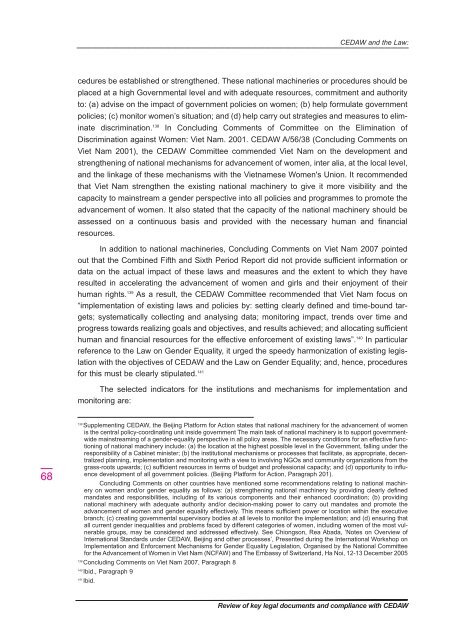English - CEDAW Southeast Asia
English - CEDAW Southeast Asia
English - CEDAW Southeast Asia
Create successful ePaper yourself
Turn your PDF publications into a flip-book with our unique Google optimized e-Paper software.
<strong>CEDAW</strong> and the Law:<br />
cedures be established or strengthened. These national machineries or procedures should be<br />
placed at a high Governmental level and with adequate resources, commitment and authority<br />
to: (a) advise on the impact of government policies on women; (b) help formulate government<br />
policies; (c) monitor women’s situation; and (d) help carry out strategies and measures to eliminate<br />
discrimination. 138 In Concluding Comments of Committee on the Elimination of<br />
Discrimination against Women: Viet Nam. 2001. <strong>CEDAW</strong> A/56/38 (Concluding Comments on<br />
Viet Nam 2001), the <strong>CEDAW</strong> Committee commended Viet Nam on the development and<br />
strengthening of national mechanisms for advancement of women, inter alia, at the local level,<br />
and the linkage of these mechanisms with the Vietnamese Women's Union. It recommended<br />
that Viet Nam strengthen the existing national machinery to give it more visibility and the<br />
capacity to mainstream a gender perspective into all policies and programmes to promote the<br />
advancement of women. It also stated that the capacity of the national machinery should be<br />
assessed on a continuous basis and provided with the necessary human and financial<br />
resources.<br />
In addition to national machineries, Concluding Comments on Viet Nam 2007 pointed<br />
out that the Combined Fifth and Sixth Period Report did not provide sufficient information or<br />
data on the actual impact of these laws and measures and the extent to which they have<br />
resulted in accelerating the advancement of women and girls and their enjoyment of their<br />
human rights. 139 As a result, the <strong>CEDAW</strong> Committee recommended that Viet Nam focus on<br />
“implementation of existing laws and policies by: setting clearly defined and time-bound targets;<br />
systematically collecting and analysing data; monitoring impact, trends over time and<br />
progress towards realizing goals and objectives, and results achieved; and allocating sufficient<br />
human and financial resources for the effective enforcement of existing laws”. 140 In particular<br />
reference to the Law on Gender Equality, it urged the speedy harmonization of existing legislation<br />
with the objectives of <strong>CEDAW</strong> and the Law on Gender Equality; and, hence, procedures<br />
for this must be clearly stipulated. 141<br />
The selected indicators for the institutions and mechanisms for implementation and<br />
monitoring are:<br />
68<br />
138<br />
Supplementing <strong>CEDAW</strong>, the Beijing Platform for Action states that national machinery for the advancement of women<br />
is the central policy-coordinating unit inside government The main task of national machinery is to support governmentwide<br />
mainstreaming of a gender-equality perspective in all policy areas. The necessary conditions for an effective functioning<br />
of national machinery include: (a) the location at the highest possible level in the Government, falling under the<br />
responsibility of a Cabinet minister; (b) the institutional mechanisms or processes that facilitate, as appropriate, decentralized<br />
planning, implementation and monitoring with a view to involving NGOs and community organizations from the<br />
grass-roots upwards; (c) sufficient resources in terms of budget and professional capacity; and (d) opportunity to influence<br />
development of all government policies. (Beijing Platform for Action, Paragraph 201).<br />
Concluding Comments on other countries have mentioned some recommendations relating to national machinery<br />
on women and/or gender equality as follows: (a) strengthening national machinery by providing clearly defined<br />
mandates and responsibilities, including of its various components and their enhanced coordination; (b) providing<br />
national machinery with adequate authority and/or decision-making power to carry out mandates and promote the<br />
advancement of women and gender equality effectively. This means sufficient power or location within the executive<br />
branch; (c) creating governmental supervisory bodies at all levels to monitor the implementation; and (d) ensuring that<br />
all current gender inequalities and problems faced by different categories of women, including women of the most vulnerable<br />
groups, may be considered and addressed effectively. See Chiongson, Rea Abada, ‘Notes on Overview of<br />
International Standards under <strong>CEDAW</strong>, Beijing and other processes’, Presented during the International Workshop on<br />
Implementation and Enforcement Mechanisms for Gender Equality Legislation, Organised by the National Committee<br />
for the Advancement of Women in Viet Nam (NCFAW) and The Embassy of Switzerland, Ha Noi, 12-13 December 2005<br />
139<br />
Concluding Comments on Viet Nam 2007, Paragraph 8<br />
140<br />
Ibid., Paragraph 9<br />
141<br />
Ibid.<br />
Review of key legal documents and compliance with <strong>CEDAW</strong>

















